The Effect of Azomite Application on Reducing the Damage of Salinity Stress in Mexican Marigold (Tagetes minuta L.)
Salinity stress is one of the main factors that limited crop production. Salt stress causes physiological effects by decreasing soil water potential. Azomite is an inorganic mineral that contains more than 60 forms of nutrients (macro and microelements). This material modifies and improves the soil, and the high ionic exchange capacity of this substance has resulted in some of it being used to reduce the effects of salinity stress. Mexican Parsley (Tagetes minuta) is a medicinal plant from Asteraceae family that used in the food and cosmetic industries. The purpose of this experiment was to investigate biochemical response and dry aerial biomass of Tagetes minuta under salinity stress and Azomite application.
A pot experiment was conducted at the research greenhouse of Ferdowsi University of Mashhad as factorial based on completely randomized design with three levels of salinity (0, 30 and 60 mM NaCl in irrigation water) and four levels of Azomite (0, 4, 8 and 12 g/kg soil) in three replications in 2018. The studied traits were included biochemical characteristics (RWC, Electrolyte leakage, chlorophyll a, chlorophyll b, carotenoid, total chlorophyll, antioxidant activity, total phenol, soluble carbohydrates, and proline) and dry biomass. Statistical analysis was performed using Minitab 17 software. The mean comparison was done by Bonferroni test at the 5% probability level. The figure drew by Microsoft Excel software.
The results of this experiment showed that the interaction effects of salinity and Azomite had a significant effect at a probability level of 1% on all of the studied traits. The highest amount of dry biomass (30.25 g.plant), RWC (74.2 %), chlorophyll a (7.5 mg.g-1FW), chlorophyll b (9.26 mg.g-1 FW), carotenoid (16.73 mg.g-1FW), total chlorophyll (33.39 mg.g-1FW) and essential oil content (0.46 %) were observed in treatment without salinity and 12 g/kg soil of Azomite. The highest amount of Electrolyte leakage (83.55 %), antioxidant activity (9727 %), Total phenol (95.10 mg.g-1FW), soluble carbohydrates (114.4 mg.g-1FW) and proline (0.12 µM/gDW) was observed on 60mM salinity and without the use of Azomite. NaCl stress can reduce nutrient uptake by the root of the plant and cause to decrease the growth of plants (Dry aerial biomass), RWC, Chlorophyll a, b, carotenoid and total chlorophyll and increase antioxidant activity, total phenol, soluble carbohydrates, and proline. Azomite in salinity stress increase water holding and inhibited the plants from Na uptake. Therefore it prevents plants from Na toxicity. The result of this study showed that the highest salinity level (60 mM NaCl) and application of Azomite especially at 12 g/kg soil level had the highest effect on ameliorating biomass and biochemical characteristics of the plant.
- حق عضویت دریافتی صرف حمایت از نشریات عضو و نگهداری، تکمیل و توسعه مگیران میشود.
- پرداخت حق اشتراک و دانلود مقالات اجازه بازنشر آن در سایر رسانههای چاپی و دیجیتال را به کاربر نمیدهد.



